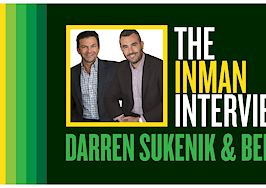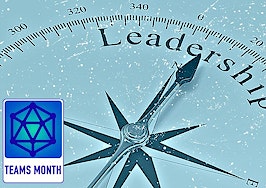 This July, Inman’s editorial theme is Teams — what it takes to build and join one, how to optimize your team for summer 2020, and even when to consider leaving one. And if you’re not already a subscriber to our Teams Beat email newsletter, sent every Thursday, sign up now.
This July, Inman’s editorial theme is Teams — what it takes to build and join one, how to optimize your team for summer 2020, and even when to consider leaving one. And if you’re not already a subscriber to our Teams Beat email newsletter, sent every Thursday, sign up now.
Rob Ellerman’s potential was evident early on in his career as a real estate agent, and now, 16 years after launching his own team, he runs the third most productive large real estate team in the country, according to the most recent Real Trends Thousand’s ranking of large teams by transaction volume. The Kansas City, Missouri-based real estate team of roughly 100 agents closed 1,155 transactions in 2019, for more than $360 million in sales volume, according to the annual ranking.
Ellerman, whose team is affiliated with ReeceNichols Real Estate, spoke with Inman earlier this month to discuss what goes into building a top team.
Earlier in your career, you were a rising star real estate agent and closed more than $1 million in sales. And then you started a team. Why go the team route rather than continuing to succeed as an agent?
I think one of the things about my team is, I grew it organically. Back when I started, there wasn’t a lot of information on teams out there. And so I didn’t really have a lot of good information to fall back on and say, “Oh, this is how you run a team.” For me, I just did everything I could as an individual, until I started seeing some things fall through the cracks.
So really, I needed help, and that’s what brought that first team member on. She and I ran it to a point where we still needed more help, then we added somebody else. Then I started getting into the new construction piece of it and every time I got a subdivision, I would hire people to sit on the subdivision. We grew it organically based on what help we needed.
And why go the team route rather than starting your own independent brokerage?
Personally, I’m not a fan of brokerage ownership. I think there are very few jobs or organizations that will pay their employees 90 to 95 percent of everything they sell. So if you think about running an organization and running it correctly, and you’re running it on 5 to 7 percent margins, it’s almost impossible to do unless you want to grow it to a massive company.
What I’m saying is: If I take 7 percent of everything that I give away to my company, then how in the world am I going to have eight offices and primo locations and office space and lights and printers and a broker, an assistant broker, a secretary, all the expenses that come along with running your own business? In my opinion, we get a lot for the money that we spend.
When you’re interviewing a potential new team member, what are you looking for? Is it the best agent, highest production or somebody that’s going to be the best fit?
It’s 100 percent the best fit. If you hire that one bad apple that doesn’t fit, it can take down your entire organization, so they have to be a good fit. That really starts with reputation, honesty, integrity and all of those traits.
If we make a human error and we mess up, we don’t try to defend ourselves and get out of it, we say, ‘Hey, we messed up we, how do we fix it?’ Over all the years I’ve been in the business, I bought refrigerators blind, anything you can imagine that you might mess up on a contract, and we step up and we take care of it.
We’ve really solidified our reputation in the community as being super honest and trustworthy. Everybody I interview that’s the first thing they tell me: “We really couldn’t find anything bad out there about you and everybody says nice things.” I’m like, “That’s a sign you need to be with us, right?”
I’m sure over the years you’ve had somebody that maybe was lagging in production or not pulling their weight for the team? How do you deal with that?
Our business is kind of tailored to the fact that you can run your business how you want to run it. Wherever you are in your life changes that.
So I may have an agent that is at a point in their life where they only want to do five transactions a year and have an agent in their life where they want to do 80 transactions a year. As they’re a fit for the company, and they’re not causing problems internally, everybody can run their business according to their lifestyle, and we’re okay with that.
We have a setup where we don’t necessarily have to pay per agent, so they don’t have to have certain production in order to be valuable to us. We may have a single mom that’s raising three kids, and they’re at a young age so she just can’t do a huge amount right now, but three or four or five years from now, she steps up and does big business. And we’ve kept her on the team during her tough times, so she stays with us for the next 10 or 15 years being a high producer.
How does the team make financial or business decisions? Is it top-down rule, a democratic process or do you lean on your top producers?
I have a lead coordinator that basically handles all incoming leads and warms them up, does the drip campaigns and then hands out. They’re handed out on a rotation basis, but area-specific as well. If you’re in line to get the next lead but you don’t work that specific area, obviously we skip over you then come back to the next one. That’s how the lead coordination piece works.
As far as the money spend, she tracks every single dollar we spend on every single Zillow lead, realtor.com lead, Google ad lead, Facebook posts, any of that stuff, and she reports to me every month with how much money we set and how much money I actually made after the lead was paid out. So I’m able to look and say, “Hey, it looks like this is still doing great,” and she’ll make suggestions, too, like, “Hey, I think we need to up our Google ad spend because this is what’s happening right now.” She’s my go-to on the ad spend.
For more internal decisions, I have a team of veteran higher producers that are on my management team that I’ll discuss other matters with, but as far as the money, that’s all me.
Has the pandemic and accompanying economic uncertainty made the teams model more vital?
I believe so. I’ve been of the opinion that the team model is a great way to run your business anyway. We recruit people that have done $15 million, $18 million, which is a big producer in our market in Kansas City. A lot of people in the industry look at it and say, “Why would they go over if they do $18 million already?” They just don’t understand that that $18 million person is going to grow their business to $30 million or $40 million with the help of us.
I think [the pandemic] did play a part in making agents look at that and say, “Hey, maybe the team is a better option for me right now.” We skyrocketed through the housing bubble crash because the cream rises to the top and people realized they needed good representation and agents that did a good job for them. Some of that has happened through the pandemic, just not nearly on as rough of a basis as the 2008 housing crash.













